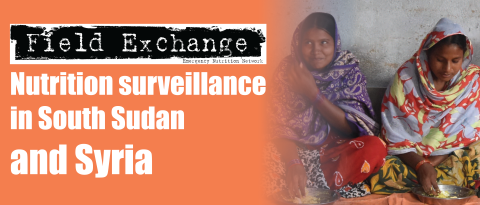Baseline technical needs assessment for the Global Technical Assistance Mechanism for Nutrition (GTAM)
Summary of review1
Location: Global
What we know: A common Global Technical Assistance Mechanism (GTAM) has been developed to address technical gaps in nutrition in emergencies (NiE).
What this article adds: A baseline needs assessment was carried out between 2018 and 2019 to identify priority thematic areas, and technical gaps within them, to inform the GTAM workplan. Methods included a review of posts on en-net (ENN’s online technical forum); surveys of Nutrition Cluster Coordinators and Country Technical Working Group members; and key informant interviews. Findings were reviewed and synthesised at the 2019 Global Nutrition Cluster (GNC) annual meeting and by a GNC partner survey. Key technical priorities were identified in the following priority areas: nutrition assessment; community-based management of acute malnutrition (CMAM); and infant and young child feeding in emergencies. The GTAM coordination team will work with Global Thematic Working Groups (GTWGs) under GTAM to identify appropriate actions in response to each technical priority. These actions will form the basis of the initial workplan and direction of the GTAM and GTWGs, which will be reviewed regularly in response to emerging needs.
In 2016, the Global Nutrition Cluster (GNC) initiated a technical task force to propose a mechanism for addressing technical gaps in nutrition programming in humanitarian contexts. The concept of the Global Technical Assistance Mechanism for Nutrition (GTAM) was developed and endorsed during the 2017 GNC annual meeting and subsequently developed.2 The three main functions of the GTAM are to: 1) provide technical advice; 2) facilitate consensus-driven guidance; and 3) provide specialised technical expertise. To design an effective service responsive to country-level needs and inform the GTAM workplan, a baseline technical needs assessment explored the key technical gaps where advice is sought by nutrition-in-emergencies (NiE) practitioners and priorities by thematic area.
Mixed methods were used between 2018 and 2019, including a review of posts on en-net (ENN’s online technical forum);3 a survey of Nutrition Cluster Coordinators (n=5); an online survey of GNC Country Technical Working Group (CTWG) members (n=33); and key informant interviews (n=22). Results were collated and shared at the 2019 GNC annual meeting, where working groups reviewed findings and identified technical priorities and next steps. Priorities were further refined by a GNC partner survey in 2019 to determine final technical priority areas.
Findings reveal that the three priority technical areas are: assessment; community-based management of acute malnutrition (CMAM); and infant and young child feeding in emergencies (IYCF-E). Within these areas, the key technical priorities identified are summarised in Box 1.
Box 1: Technical NiE priorities identified in the GTAM baseline needs assessment
Assessment:
- Influence of body shape on anthropometric status;
- How to undertake sampling in pastoral areas;
- Estimating dietary intake among households eating from a common plate;
- Estimating feeding practices in children older than two years.
CMAM:
- Alternative moderate acute malnutrition (MAM) management;
- Clear guidelines on what to do in the absence of a therapeutic product;
- Clarity/guidance on simplified protocols/combined protocols/expanded criteria using ready-to-use therapeutic food (RUTF)/ready-to-use supplementary food (RUSF) for the management of severe acute malnutrition (SAM) and MAM;
- Better integration of SAM screening for infants under six months of age for community volunteers;
- How to best calculate the SAM and MAM caseload? (What is the correct incidence correction factor to be used?)
IYCF-E:
- Clear guidance on monitoring and evaluation for IYCF-E;
- Strong global guidance on the management of non-breastfed infants in emergencies using ready-to-use infant formula (RUIF);
- Impact of cash-based programmes on IYCF practices;
- Direct impact of IYCF programmes on stunting and wasting;
- Review of current guidance on IYCF Corners and mother-and-baby areas (MBAs) to streamline and widely disseminate.
These will inform the initial workplan and direction for the GTAM and the Global Thematic Working Groups (GTWGs) under GTAM. A system to ensure ongoing monitoring of issues and questions coming into the GTAM mechanism will be put in place to ensure that GTAM is agile enough to respond to any changing and emerging needs not reflected in the baseline.
Planned next steps are to share the identified technical priority gaps with relevant GTWGs to examine identify best way forward4, obtain feedback from Nutrition Cluster Coordinators on whether the suggestions will provide practical solutions to the country-level technical needs; and identify who is best placed to take actions forward. More straightforward actions will likely be addressed by the GTAM Coordination Team (GTAM-CT), while more complex issues, where current guidance is unclear or non-existent, will be carried out by specialised GTWGs and their networks (for example; within academia). It is recommended that agreed actions are included in costed GTWG workplans.
Moving forward, channelling technical questions that cannot be answered at country level into a central entry point for technical support (i.e. the GTAM) offers the opportunity for the regular and systematic analysis of challenges faced by a broad range of NiE practitioners.
For more information, please contact Isabelle Modigell.
Endnotes
1GTAM (2019) Baseline technical needs assessment. Available from: www.ennonline.net/resource/baselinetechnicalneeds2019
2See article in this issue of Field Exchange ‘Global Technical Assistance Mechanism for Nutrition (GTAM): The story so far’.
3Results of the en-net review are shared in the accompanying article in this issue of Field Exchange, ‘A review of technical discussion on en-net: Recurring questions and gaps experienced by programmers’.
4A process that has already been undertaken with the Infant Feeding in Emergencies Core Group for the priorities highlighted under IYCF-E.


